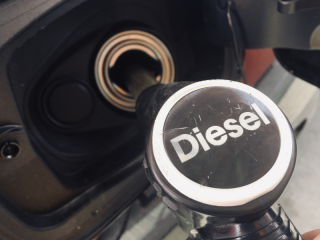
What is red diesel?
Red diesel, or gas oil, is a fuel currently used in off-road vehicles and machinery. Traditionally, this fuel is cheaper than standard diesel as it’s taxed at a much lower rate. Companies that are able to use red diesel can save significantly more than those using white diesel.
Red diesel is very similar to white diesel; however, it contains a red dye and chemical markers to prevent its misuse in road vehicles.
What’s changing with red diesel in April 2022?
Currently, red diesel can be used in any machine which is not a road vehicle, such as tractors and bulldozers. However, from 1st April 2022, the entitlement to use rebated red diesel will be removed for most sectors, including construction. This will significantly impact many industries, as it will be illegal to use red diesel in the tank of a vehicle or machine that’s no longer entitled to use it.
HMRC has published guidance on the upcoming changes and it’s recommended that you start preparing for them now to ensure that you remain compliant.
Who will the red diesel changes apply to?
To help reduce harmful greenhouse gases and promote low-carbon red diesel alternatives, the UK Government is removing many sectors and industries from the red diesel entitlement list. The construction industry will arguably be affected the most as they’ll no longer be able to use red diesel to power heavy plant and equipment that’s used for construction purposes.
Red diesel will also be inaccessible for use in the following industries and circumstances:
Mining and quarrying
At ports
For manufacturing (e.g. ceramics, steel, timber)
Road maintenance
Airport operations
Oil and gas extraction
Plant hire, logistics or waste management
Refrigeration units on lorries
Leisure
Certain industries that are reliant on red diesel, such as agriculture and rail transport, are exempt from these changes.
Can I buy red diesel before 1st April and store it?
If you’re going to be affected by these changes and therefore no longer able to use red diesel from 1st April 2022 then you must run down your stocks of fuel before this date.
The UK Government advises those that have any surplus red diesel in storage tanks after 31st March 2022 will need to:
Sell it or give it to someone who is eligible to use it
Sell or give it to any Registered Dealer in Controlled Oil (RDCO)
Dispose of it via an approved waste oil recycling or disposal company
Contact HMRC if you’re unable to get rid of it yourself
You will be required to keep records that show how and when the fuel was disposed of or sold. However, you can sell or dispose of the surplus fuel without needing to be approved by HMRC as an RDCO.
Do I need to flush a tank that’s used red diesel before I can use white diesel?
Businesses will not be expected to flush out all traces of red diesel from storage tanks, but you should make plans to empty and refill them with white diesel in preparation for the rule changes.
Vehicles or machines that can be used for both entitled and non-entitled purposes must either be flushed to remove all traces of red diesel between uses or always be fuelled with white diesel. Particular care will also be needed with hired equipment, so it’s important to check its previous use.
What actions do businesses need to take before 1st April?
Businesses that are not exempt from these changes need to assess existing stocks of red diesel and develop a plan for running them down. If you need to order supplies of red diesel between now and 1st April 2022, then you should ensure that you’re only ordering the amount that you expect to use by that date.
It’s also important to save all your invoices and receipts so that you can prove you haven’t been stockpiling red diesel and have been purchasing full-duty fuels. This will allow you to stay abreast of HMRC requirements. Businesses will also need to determine a plan for moving to white diesel which may include flushing out tanks, if necessary.
What action can HMRC take if they find red diesel?
HMRC officers are entitled to carry out checks on any plant and equipment using diesel to confirm whether the correct fuel is being used. They can then seize vehicles and machines found to be running unlawfully on red diesel. Anyone found to be breaking these new rules can also face fines and criminal sanctions.
What evidence do businesses need to provide to prove the correct diesel has been used?
If HMRC officers need to assess whether a business is using the correct fuel, then it’s important to ensure that you have these documents readily available:
Receipts or invoices for the purchase of fuel
Contracts for the hire of plant or equipment
Run plans
Timesheets of drivers/operators
In addition, businesses may be required to provide a fuel sample to HMRC so that they can determine if the correct diesel has been used.
How have businesses reacted to these changes?
Many businesses that are reliant on red diesel to fuel their vehicles and equipment have protested the upcoming changes as they will face a considerable increase in their fuel prices. Contractors have argued that these changes will be catastrophic for the construction industry which is still suffering from rising material and labour costs.
In addition, the Resource Management Association Scotland (RMAS) has warned that these plans will further impact the UK’s cost of living crisis. Businesses are therefore concerned that the cost implications of switching to white diesel could put them in financial jeopardy.
How can Right Fuel Card help?
The changes being enforced from 1st April 2022 will have some serious implications for many businesses. Keeping track of receipts and invoices can be complicated and time-consuming and the increased price of white diesel will quickly cause running costs to rise.
David James, Sales Director at Right Fuel Card says, “1st April 2022 will mark the beginning of the new rules on who and what can use red diesel in the UK. We appreciate that for many of our customers, especially those within the construction industry that this will have a huge economic impact, especially at a time when fuel prices are at all-time record highs. The current duty on Red Diesel is 11.14ppl so from April 1st those who no longer have the entitlement will be spending an additional 46.81p per litre of diesel, a near 30% increase overnight.”
Right Fuel Card can help you to navigate these changes. We offer pre-approved HMRC invoices with clear information about all your payments, allowing you to easily provide evidence to HMRC officers if needed.
Our range of fuel cards can also help to limit the rising costs as we offer fixed weekly pricing that’s highly competitive and can save you money at the pump. Our free online account management system provides detailed reports on your fuel cards’ activity. This allows you to monitor driver behaviour and individual fuel consumption and then make appropriate changes to improve fuel efficiency, saving your business money. To find out more about how we can help you save, contact our team today.




